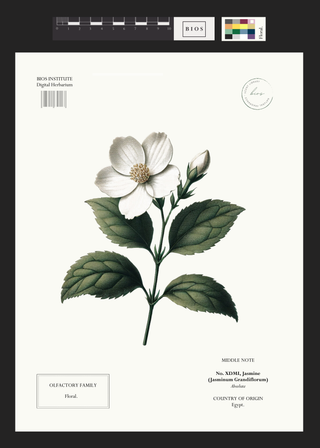

Jasminum grandiflorum, commonly known as Spanish jasmine, royal jasmine, or poet's jasmine, is native to the Indian subcontinent. It is indigenous to regions in northern India, specifically the Himalayan foothills and some parts of Pakistan. Ours is sourced from India.
Jasmine emits a sweet, floral, and exotic aroma that is often described as sensual, romantic, and seductive. Its scent is complex, with hints of fruity and green undertones. Jasmine is known for its heady and captivating fragrance that can linger for hours.
Jasmine is a Middle note in our Floral family. It blends well with other floral notes like rose, ylang-ylang, and tuberose, as well as with citrus, spice, and woody notes. Jasmine can add depth, warmth, and a touch of elegance to perfumes.
Jasmine is a popular ingredient in floral bouquet compositions, where it adds a rich and sensual element. It is also featured in soliflore perfumes, which focus solely on the scent of a single flower. Jasmine soliflores showcase the beauty and complexity of the jasmine flower, allowing its fragrance to take center stage.
Jasmine has symbolic meanings in various cultures. It is associated with love, beauty, sensuality, and purity. In some cultures, jasmine flowers are used in wedding ceremonies and as traditional offerings to deities. The enchanting scent of jasmine is believed to have uplifting and aphrodisiac properties.
Jasmine is widely appreciated for its exquisite scent and has been a cherished ingredient in perfumery for centuries. Its alluring aroma and cultural significance make it a beloved and sought-after note in creating captivating and romantic fragrances.
The use of jasmine in perfume making has a long history in Egypt. Egyptians have mastered the art of extracting the fragrant essence from jasmine flowers, which is then used as a key ingredient in creating perfumes. Perfumes scented with jasmine were highly valued and considered a luxury in ancient Egypt. The exquisite fragrance of jasmine was believed to bring a sense of divine presence and enhance spiritual experiences.
Jasmine flowers have been used as offerings in religious ceremonies and rituals in ancient Egyptian culture. The delicate white flowers were considered sacred and symbolized purity and spiritual connection. They were offered to gods and goddesses as a way of expressing devotion and seeking blessings. Jasmine was often used in temple rituals and during important religious festivals.
Jasmine is associated with love, beauty, and spirituality in Egyptian culture. Its intoxicating fragrance is believed to have a calming and uplifting effect on the mind and soul. In spiritual practices, burning jasmine incense or using jasmine-infused oils is considered a way to purify the atmosphere, evoke positive energy, and connect with higher realms.
In Egyptian wedding traditions, jasmine plays a significant role. Jasmine flowers are commonly used in bridal bouquets, headdresses, and floral decorations. The delicate and sweet fragrance of jasmine is believed to bring good luck, happiness, and love to the newlyweds. It is considered a symbol of purity and marital bliss.
Jasmine is also valued for its therapeutic properties in Egyptian traditional medicine. It is believed to have calming and soothing effects on the mind and body. Jasmine-infused oils or jasmine-scented baths are used to promote relaxation, relieve stress, and enhance overall well-being.
Jasmine
- Unit price
- /per
Please note this product format is a small vial that contains roughly 20 drops of scent concentrate. This can be purchased à la carte but is intended to be used with our Perfume Kit.
SCENT SPECIFICATIONS
Latin Name: Jasminum Grandiflorum
Extraction Method: Solvent Extracted
Country of Origin: India
All of the scents in our library our naturally derived - our collection includes essential oils, absolutes, concretes, isolates, enfleurage, macerations, oleoresins, and mixed medium naturals.
Adding product to your cart
Jasminum grandiflorum, commonly known as Spanish jasmine, royal jasmine, or poet's jasmine, is native to the Indian subcontinent. It is indigenous to regions in northern India, specifically the Himalayan foothills and some parts of Pakistan. Ours is sourced from India.
Jasmine emits a sweet, floral, and exotic aroma that is often described as sensual, romantic, and seductive. Its scent is complex, with hints of fruity and green undertones. Jasmine is known for its heady and captivating fragrance that can linger for hours.
Jasmine is a Middle note in our Floral family. It blends well with other floral notes like rose, ylang-ylang, and tuberose, as well as with citrus, spice, and woody notes. Jasmine can add depth, warmth, and a touch of elegance to perfumes.
Jasmine is a popular ingredient in floral bouquet compositions, where it adds a rich and sensual element. It is also featured in soliflore perfumes, which focus solely on the scent of a single flower. Jasmine soliflores showcase the beauty and complexity of the jasmine flower, allowing its fragrance to take center stage.
Jasmine has symbolic meanings in various cultures. It is associated with love, beauty, sensuality, and purity. In some cultures, jasmine flowers are used in wedding ceremonies and as traditional offerings to deities. The enchanting scent of jasmine is believed to have uplifting and aphrodisiac properties.
Jasmine is widely appreciated for its exquisite scent and has been a cherished ingredient in perfumery for centuries. Its alluring aroma and cultural significance make it a beloved and sought-after note in creating captivating and romantic fragrances.
The use of jasmine in perfume making has a long history in Egypt. Egyptians have mastered the art of extracting the fragrant essence from jasmine flowers, which is then used as a key ingredient in creating perfumes. Perfumes scented with jasmine were highly valued and considered a luxury in ancient Egypt. The exquisite fragrance of jasmine was believed to bring a sense of divine presence and enhance spiritual experiences.
Jasmine flowers have been used as offerings in religious ceremonies and rituals in ancient Egyptian culture. The delicate white flowers were considered sacred and symbolized purity and spiritual connection. They were offered to gods and goddesses as a way of expressing devotion and seeking blessings. Jasmine was often used in temple rituals and during important religious festivals.
Jasmine is associated with love, beauty, and spirituality in Egyptian culture. Its intoxicating fragrance is believed to have a calming and uplifting effect on the mind and soul. In spiritual practices, burning jasmine incense or using jasmine-infused oils is considered a way to purify the atmosphere, evoke positive energy, and connect with higher realms.
In Egyptian wedding traditions, jasmine plays a significant role. Jasmine flowers are commonly used in bridal bouquets, headdresses, and floral decorations. The delicate and sweet fragrance of jasmine is believed to bring good luck, happiness, and love to the newlyweds. It is considered a symbol of purity and marital bliss.
Jasmine is also valued for its therapeutic properties in Egyptian traditional medicine. It is believed to have calming and soothing effects on the mind and body. Jasmine-infused oils or jasmine-scented baths are used to promote relaxation, relieve stress, and enhance overall well-being.
